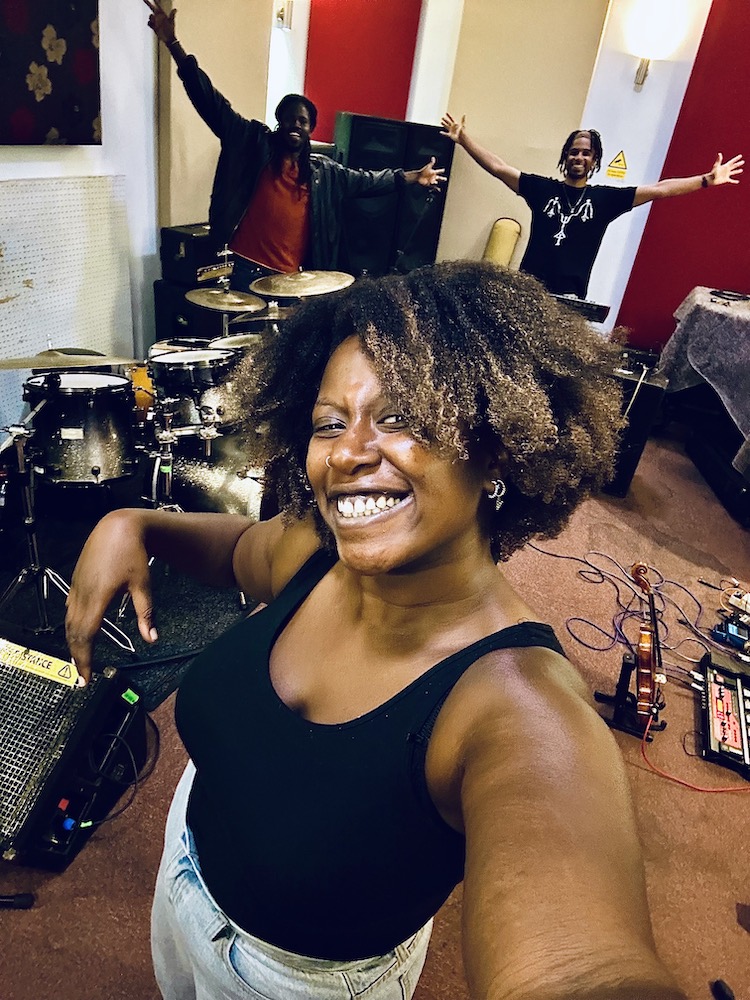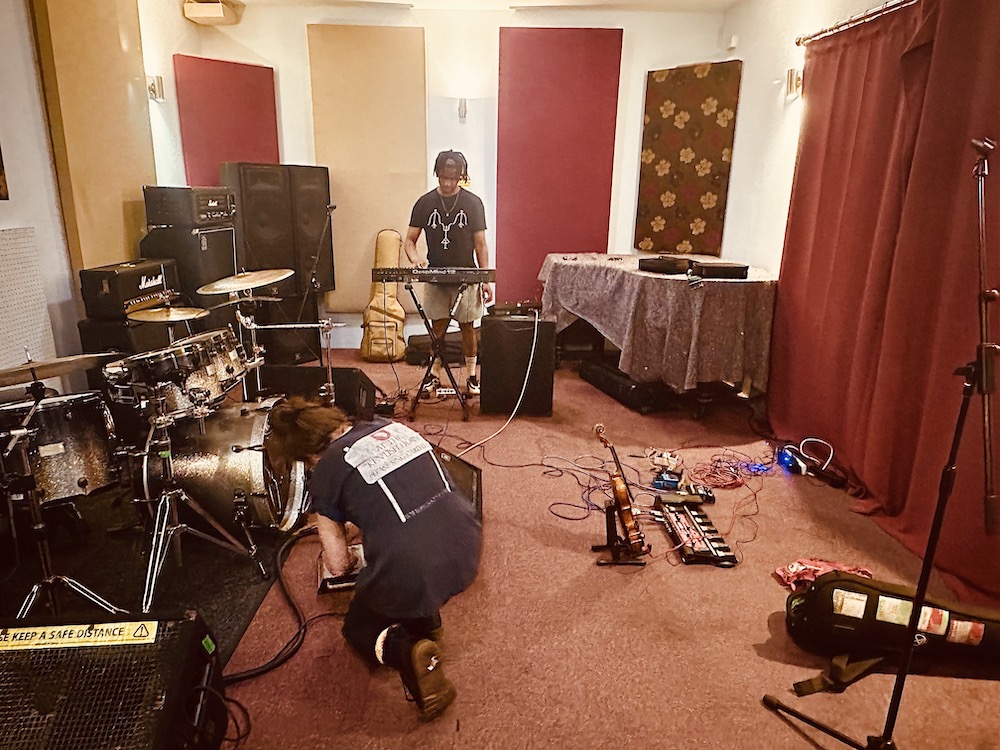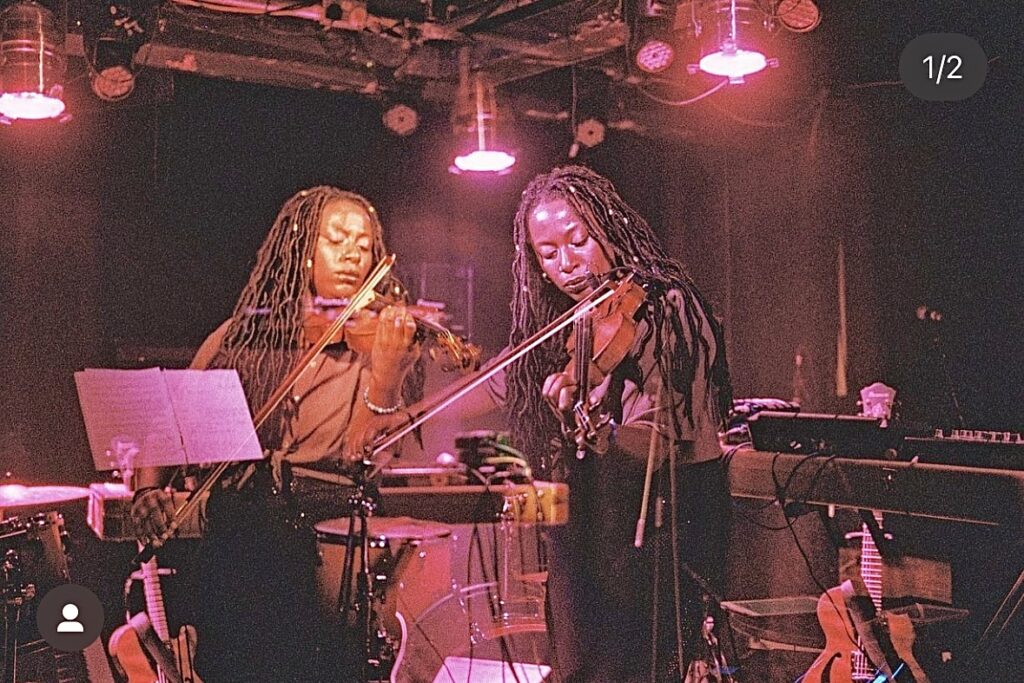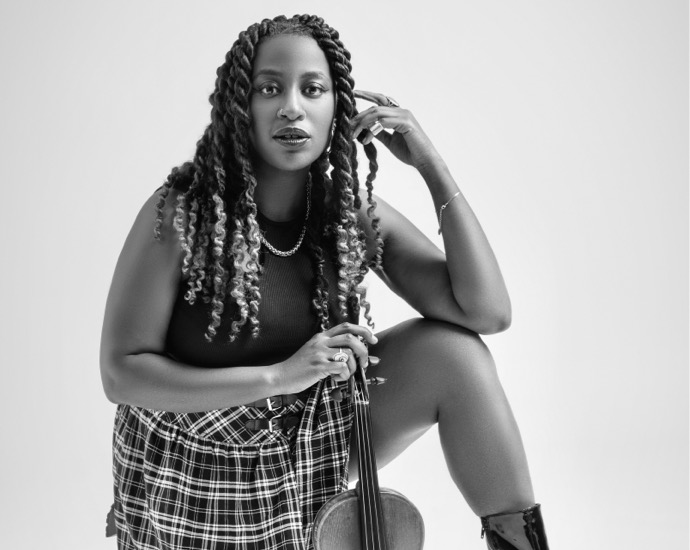Digging into the creative process, Byta speaks with artists, musicians, producers, DJs and anyone involved with music creation. A conversation about how they create, collaborate and share music. From studio setups to routines, and the first person to hear about the next 'big' work.
Where are you based?
SE London.
How, when and where did you start making music? Are you primarily a musician or a producer, or do something else?
By trade I’m a professional violinist and perform around the world with orchestras, artists and different ensembles from the classical/jazz and pop world. I have played on recordings for major artists such as NAO, Nubya Garcia and Alicia Keys. Over the years things have evolved and alongside my performing career, I’m now a recording artist, composer, loop pedal artist and producer.
I started writing music in 2017 – after graduating from RNCM with a degree in classical violin performance, I discovered jazz and improvisation and spent 5 years going to as many jams as possible, learning the craft and developing my skills in harmony and composition. At this point I was living in Manchester, and I met and collaborated with an eclectic mix of inspiring and incredible musicians. With one friend I learnt how to use the Boss RC300 loop pedal, and from there created my own way of writing music live. I formed a band called Täpp in 2017 and in 2019 recorded an EP featuring drummer Abi Phillips, jazz pianist Alex Hill, percussionist/DJ Tom Burford (aka Contours) and studio engineer Alex Armstrong-Holding. This EP evolved into an album (over the 2020-2021 lockdown) titled: ‘I like what I do // I do what I like’. It features drummer Ayo Salawu, Chantelle Gabriella Jazz and Michelle Tiwo on spoken word and vocals from jazz singer And Is Phi.
It was my first step into music production, remote recording and releasing music independently. Täpp’s first studio album came out in June 2021, and I went on to self-release my debut solo album ‘Selected Works Vol.1’ in September 2023.
Who would you consider some of your biggest influences when it comes to your “sound”?
I have inspirations from across the whole musical spectrum. I was raised on a mix of jazz, soul, blues reggae, rock and classical music, and have vivid childhood memories of listening to Miles Davis and Jimi Hendrix on vinyl with my mum. The album ‘Kind of Blue’ definitely made a big impact on me from a young age. I’m from the MTV Base era and watched a lot of R&B/Hip-hop and Bassline. I was obsessed with Dre Dre (2001 album), Eminem (especially his first two releases) and hip-hop instrumentals. I’m also a UK Garage baby, and remember listening to Craig David/Artful Dodger ‘Re-wind’ on pirate radio as a kid. I was really into the synth string samples that feature heavily UK Garage… love the harpsichord sample in So-Solid’s ’21 seconds’!
I started playing the violin at age 3, so I had many, many years of youth/county orchestras, school choirs and Saturday music school (Junior Royal Academy of Music). This has meant that some of my biggest musical influences are from the classical world. Growing up composers such as Bach, Mozart, Beethoven, Mendelssohn, Brahms, Sibelius and Shostakovich greatly stimulated my imagination, and inspired my creativity. I’ve played a lot of Baroque music over the years and have a strong affinity for this style as well.
Whilst studying at the Royal Northern College of Music (RNCM), I discovered contemporary classical composers such as Steve Reich, Phillip Glass and Max Richter. Their compositions and techniques greatly inspire how I approach live looping. At this time I also discovered electronic dance music and was greatly influenced by artists such as Mount Kimbie, James Blake, Fourtet, Floating Points, Aphex Twin and Venetian Snares.
When I returned to London in 2019, I submerged myself into the phenomenal London Jazz scene, discovering artists such as Ezra Collective, Joe-Armon Jones, Blue Lab Beats, Nubya Garcia, Moses Boyd, Yussef Dayes, Shabaka Hutchings, KOKOROKO and so many more. I was a weekly regular performing/jamming with Steam Down at Matchstick Piehouse and refining my style of fusing fx pedals with acoustic violin. All these influences have informed my personal sonic palette in which I’m able to create original music that flows effortlessly through different genres, styles and sounds.
Explain your creative process. Do you have a routine?
My creative process is forever changing and adapting to the busy and sometimes chaotic schedule of a freelance violinist. Practice is a big part of my routine – every musician needs to keep maintaining, refining, and elevating their technique. Luckily, I’m involved in a lot of incredible projects and collaborations spanning several different genres from classical to folk, jazz to world music. I’m provided with endless opportunities to play and perform, push the boundaries, challenge my technique, and satisfy my musical tastes. I use these experiences as opportunities to learn how to write all types of music.
I enjoy improvising when I’m looping live. I’ll normally need some sort of inspiration – either a colour, key, or scenario, but seem to flourish best when its performed in the moment. When I’m writing and producing at home I kind of follow a similar formula, but I have time to really focus on each melody and harmony line. I find once I get into it I can record for hours and hours.
What is your “studio” setup?
Ok, so I have two different setups for live performance and recording at home. For remote recording, I use a laptop (Logic Pro), DPA mic, Beyerdynamic Dynamic Ribbon Mic, and acoustic violin. On stage I use a Boss RC300 Loop pedal, DPA mic or Fishman pick up (depending on the venue space), Alesis drum pad, Roland JDxi Synth, acoustic violin and sometimes hand percussion.

What is your process when working with other people? How is collaboration different in the studio vs working remotely?
My process when working with other people is different depending on the project brief, instruments involved, the setting/venue, and for me, whether its an acoustic or electronic gig. When I’m performing at jam nights with other musicians the process is completely electric… there’s nothing like it! You’re entirely in the moment. At times there’ll be a discussion of keys/chords – but often these things are created along the way, mainly by the rhythm section. Its organised chaos – solidified by each musician listening, anticipating and reacting in the moment.
Working in an orchestra, band or being in a writing session is indeed a lot calmer process. Orchestral rehearsals are methodical and detailed. There is an expectation that each musician has prepared ahead of the rehearsal so everyone is able to follow the conductor, and work in synergy with one another. Band rehearsals and writing sessions are a lot freer, with room for experimentation and mistakes. More time can be spent discussing ideas and although it can take more time, the end results are incredibly rewarding.
When I’m working remotely the process is definitely very different. Sometimes its challenging drawing ideas from nothing. It helps to listen to lots of music and engage with different types of media and art to get inspired. I’d say working remotely means that you’re in charge of everything – which can be very daunting, but it also allows a level of freedom and artistic integrity (again, depends on the brief), which I find exhilarating.
At what point(s) are you comfortable letting other people hear what you are working on?
As unusual as it sounds, I think after years of improvising live and playing in jams, I’ve grown comfortable with letting people hear what I’m working on. I’m so used to creating in the moment. Often when I’m writing it’s to a deadline of some sort, so I’m used to having to present something quickly. I don’t mind the pressure!

Do you share your work in progress (streams or downloads)? Any technical frustrations?
Yes, I do share my works in progress – I have many amazing musical friends and have access to a varying audience of people to get feedback from. If I face an issue or challenge with the tech I’m on the phone to my engineer friends! You’ve got to have a second pair of ears when you’re creating, I’ve been lucky to find a base of contemporaries that I can share with and learn from.
How do you know when a track/album is finished?
Hmmm, I think it’s different for every artist. For me, if I don’t cringe when I’m listening then it’s ready! Seriously though, for me the writing process can be quite quick, but mixing and producing can take months and even years to complete. You can get lost down sound rabbit holes, and go from loving your creation, to completely hating it, and feeling confused as to how you got there. Personally, the ‘not cringe’ technique gives me the freedom to let go of a track or piece and make peace with the fact that it is ‘finished’… And then, you’ve got the mastering stage – but that’s a whole other story! There’s something quite magical about seeing yourself as an artist evolve over time. Your sound develops, you become sharper and smarter. It’s important to experience that evolution…you’ll never be ‘finished’ and there’s always more to come.
How do you listen to the final mixes/mastered work?
When I’m in my home studio I use Sennheiser HD560 headphones and Rokit 5’s. I was very lucky to have access to Strongroom Studio whilst I produced both albums from 2020 – 2022 (forever grateful to Fi Roberts and Jake for that opportunity!)
I’ve also listened to final mixes and masters on my car speakers, and yeah I guess even AirPods and other styles of headphones. It’s good to listen on a wide variety of speakers and headphones. Final mixes/masters are either sent to me by the recording/mix engineer or if I’ve recorded them remotely, I’ll be mixing them myself.
How important is pre-release security when sharing new work?
I guess for me I’ve never really had issues with pre-release security. I take the usual procedures required to protect my music, but generally the community that I work in is genuine and trustworthy. As an independent artist I’m usually trying to share my music with as many people as possible, so I can allow myself to be flexible with that.
Who on your team gets to hear the final versions first and why, what formats do they each need?
So I have a wide network of friends who are musicians, engineers and tech savvy creatives, and collaborate with them on different projects. For the 2 albums I worked closely with Fi Roberts and Jess Camilleri on mixing/producing, and Kate Tavini on mastering. They were the first people to hear the final versions of everything.

Outside of your inner circle who are the people that will need to hear the new tracks next?
After sharing new tracks with my recording/mastering engineers I then showcase them with a select few close friends – but I also like to be spontaneous with it. As I said before, I’m in a very fortunate position to be part of many wonderful musical projects and ventures. I get to play and work with so many interesting characters, and you can sometimes forge close connections through these musical experiences. I sometimes will share new tracks with these connections to get their insight. It’s important to share new music with a varied audience…I’m intrigued to hear the opinions of musicians who aren’t necessarily classical or play a string instrument. I will often share via a private download link, Soundcloud link or WeTransfer. For demos I normally share in mp3 format, however, for final mixes or masters I’ll send over as a wav. file.
Anything you are working on, anyone you are working with and want to share?
I released my solo album ‘Selected Works Vol.1’ in September 2023 and have been working hard on promoting it and getting it out there. So right now, I’m hunkering down over winter, taking a break, practising, living life and creating a release plan for an upcoming new single release in 2024. There’s a plan for a solo 2024 tour in the works depending on how funding works out. I’d love to perform next year and share my live set around the UK… I guess we’ll just have to see how it all goes!

